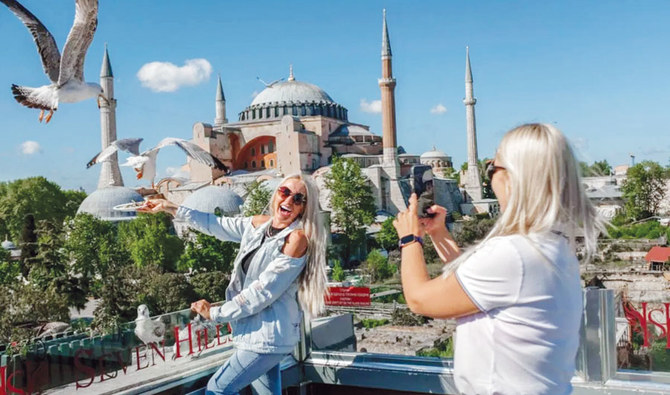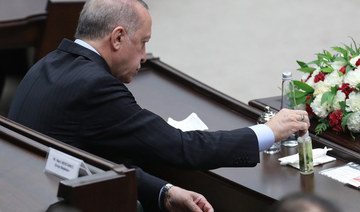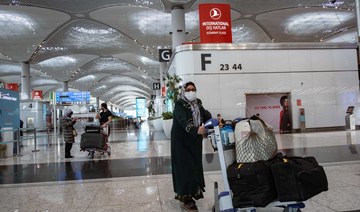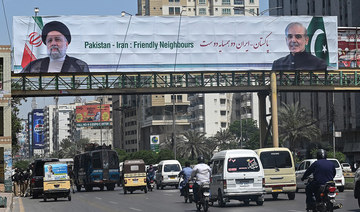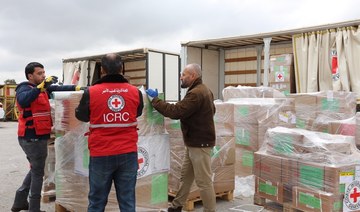ANKARA: Contrary to the expectations and moves of appeasement by the Turkish government, Russia has extended a flight ban to Turkey that was to expire on June 1 amid the tourism season.
The continuation of the travel ban to Turkey — in effect since mid-April due to rising infection rates in the country — is expected to last a further three weeks at the earliest and will seriously affect Turkey’s hospitality industry, which depends on visits by about half-a-million Russian holidaymakers who will now find alternative vacation spots.
In 2020, about 2.1 million Russians visited Turkey, and the cash flow from tourism serves to fund Turkey’s foreign debt.
Apart from health concerns, the decision is considered a political tit-for-tat move after Turkey backed Ukraine in its conflict with Kremlin, which has about 100,000 troops at the border with Ukraine. Ukraine President Volodymyr Zelenskiy’s visit to Istanbul also angered the Kremlin.
“Considering that the number of daily COVID-19 cases in Russia is actually higher than the number of daily cases in Turkey, it is hard not to believe there are some political motives behind Moscow’s decision to extend the travel ban on Turkey,” said Emre Ersen, an expert on Turkey-Russia relations from Marmara University.
It is not the first time that Russia has used tourism as leverage against Turkey.
After the downing of a Russian fighter jet by Turkish armed forces on the Syrian border in November 2015, the Kremlin announced a package of economic sanctions including an end to charter flights between the two countries, denying Turkey more than 3 million Russian tourists annually.
Russian tour operators were also urged to not sell travel packages to visit Turkey.
“Even though the two countries have been developing relations in the fields of trade and energy, Russia is concerned about Turkey’s position as a NATO member,” Ersen told Arab News.
Some Russian politicians have also voiced concerns about Turkey drifting from the Russian orbit, and urged the authorities to use the tourism card against Ankara.
Not visiting Turkey “would be our society’s truly powerful response to the irresponsible statements of a nationalist leader who invites Russians to vacation in hopes of their unconditional love for the warm sea,” Russian lawmaker Konstantin Kosachev wrote on his official Facebook page, criticizing Turkish President Recep Tayyip Erdogan’s support for the Ukraine.
According to Ersen, Ankara’s growing military-strategic ties with the Ukraine and continuing disagreements between Turkey and Russia on Syria and Libya, as well as the latest decision by Poland — which has been critical of Russian foreign policy in the past few years — to buy Turkish drones are significant factors.
FASTFACT
Russian Foreign Minister Sergei Lavrov warned Ankara over its rapprochement with the Ukraine, saying that encouraging ‘aggressive’ Ukrainian actions toward Crimea and Kiev’s militaristic sentiment directly violated Russia’s territorial integrity.
Russian Foreign Minister Sergei Lavrov warned Ankara over its rapprochement with the Ukraine, saying that encouraging “aggressive” Ukrainian actions toward Crimea and Kiev’s militaristic sentiment directly violated Russia’s territorial integrity.
Turkey recently took steps toward defense cooperation with Poland, which will buy 24 Bayraktar TB2 drones — a medium-altitude and long-range tactical UAV system — from Turkey. The contract makes Poland the second NATO member state to operate the UAV, currently used by the Turkish armed forces.
Turkey also sold drones to the Ukraine in 2019. The drone deals with these two key countries are considered a signal to NATO that Turkey contributes to the efforts of the alliance against Russia.
The Russian Federal Security Service recently announced an increase in the numbers of drone flights close to the border with the Ukraine, although Ankara has repeatedly said that the drone deal with the Ukraine is not directed against Russia.
“The prolongation of the ‘travel ban’ is clearly a political tool aimed at showing Turkey Russia’s dissatisfaction about what Russia perceives as Turkey’s actions against its interests, as well as a signal that if the trend continues, there will be serious consequences,” Karol Wasilewski, an analyst at the Warsaw-based Polish Institute of International Affairs, told Arab News.
According to Wasilewski, Russia has been observing the messages that Turkey has been trying to send to its Western allies since Joe Biden became US president and has decided to take firm action.
For Wasilewski, what makes this even more interesting is the context. “When we speak about Turkey-Russia relations, we concentrate on Turkey’s approach toward Ukraine and the recent deal with Poland, but one needs to remember that very soon there will be a NATO summit, the first Biden-Erdogan meeting,” he said.
The much-awaited meeting will take place on the sidelines of the June 14 NATO leaders’ meeting in Brussels, where parties are expected to discuss the re-inclusion of Turkey in the F-35 fighter jet program, Countering America’s Adversaries Through Sanctions Act (CAATSA) sanctions, and the Russian defense system S-400.
On Monday, Ankara displayed its readiness to address US concerns over Russia’s influence in the region by deciding to send home Russian missile experts monitoring the S-400 air defense technology.
Wasilewski says the time is approaching for Turkey to make its final choice about S-400, and perhaps about its strategic orientation — and what Russia is trying to do is to show Turkey what is at stake.
“With Russia’s actions, Turkey’s decision-makers will have to carefully weigh their options. I guess this will be a very important factor influencing their behavior during the NATO summit and their approach to what Joe Biden may offer to them,” he said.
Turkey recently convinced NATO allies not to impose sanctions on Belarus, the closest ally of the Kremlin, after it forced a passenger plane to land to arrest a dissident journalist onboard.
The move was considered a tactic by Turkey to extend an olive branch to the Kremlin to ensure a flow of Russian tourists during the approaching summer, thus preventing another lost season.
But Russia has not lifted its flight ban, leaving observers to conclude that the diplomatic maneuver appears to have failed.



